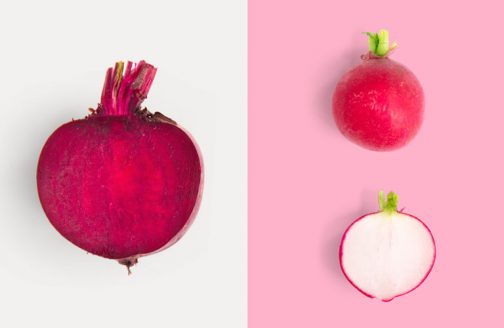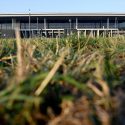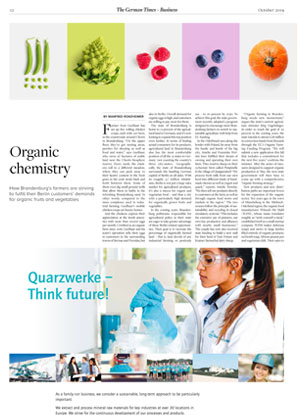How Brandenburg’s farmers are striving to fulfill their Berlin customers’ demands for organic fruits and vegetables

Farmer Sven Geelhaar has set up five rolling chicken coops, each with 220 hens, in the countryside around Chorin in Brandenburg. “On the upper floor, they’ve got nesting areas, perches for sleeping as well as food and water,” says Geelhaar, who owns 97 hectares of arable land near the Chorin biosphere reserve. Every week, the chickens roll to a different meadow, where they can peck away to their hearts’ content in the fresh grass as the cock struts back and forth between them. Some of them even dig small ground wells that allow them to bathe in the refreshing Brandenburg sand. In other words, compared to the mass complexes used in industrial farming, Geelhaar’s mobile chicken coops are luxury homes. And the chickens express their appreciation at the lavish amenities with more than 20,000 eggs per month. Certified as an organic farm since 2016, Geelhaar and his team’s operation sells their eggs to customers in the surrounding towns of Bernau and Prenzlau, but also in Berlin. Overall demand for organic eggs is high, and customers are willing to pay more for them. The state of Brandenburg is home to 12 percent of the agricultural land in Germany, and it’s now looking to expand this top position even further. In terms of finding actual consumers for its products, agricultural land in Brandenburg also has the most comfortable position of all the 13 states in Germany (not counting the country’s three city-states). Geographically, the state of Brandenburg surrounds the bustling German capital of Berlin on all sides. With its roughly 3.7 million inhabitants, Berlin is not just a large sales market for agricultural products, it’s also a mecca for vegans and vegetarian food – and thus a city with a particularly high demand for organically grown fruits and vegetables. In the coming years, Brandenburg politicians responsible for agricultural policy in their state are eager to take greater advantage of these Berlin-related opportunities. Their goal is to increase the percentage of organically farmed land – that is, land devoid of any industrial farming or pesticide use – to 20 percent by 2030. To achieve this goal, the state government recently adopted a program designed to encourage more Brandenburg farmers to switch to sustainable agriculture with help from EU funding. In the Oderbruch area along the border with Poland, far away from the hustle and bustle of the big city, Amelie and Franziska Wetzlar have fulfilled their dream of owning and operating their own farm. They tend 62 sheep on their 13-hectare farm called Pimpinelle in the village of Quappendorf: “We process fresh milk from our own herd into different kinds of handmade cheeses as well as yogurt and quark,” reports Amelie Wetzlar. “We then sell our products directly to customers at the farm, as well as through organic food stores and markets in the region.” The two women follow the principle of sustainability and recycling in closed circulatory systems: “This includes the extensive use of pastures, our own hay production and alliances with nearby small businesses.” The couple has now also received state funding to build a new stall for their herd of East Frisian and Krainer Steinschaf dairy sheep. “Organic farming in Brandenburg needs new momentum,” argues the state’s current agriculture minister Jorg Vogelsanger. In order to reach the goal of 20 percent in the coming years, the state intends to attract €28 million in conversion funds from Brussels through the EU’s Organic Farming Funding Program. “We will submit a new application this fall that includes a commitment for the next five years,” confirms the minister. After the series of measures designed to support organic production in May, the next state government will then have to come up with a comprehensive “organic farming strategy.” New products and new distribution paths are important levers for the expansion of the organic sector. Ten years ago, in the town of Muncheberg in the Markisch- Oderland region, the organic food manufacturer Wunsch Dir Mahl (WDM), whose name translates roughly as “wish yourself a meal,” established itself as a small startup company. WDM makes delicious soups and stews in large kettles filled entirely of organic products: red lentil soup, African peanut pot and vegetarian chili. Their sales to organic supermarkets are doing so well that their kitchen now employs a team of 14 people. “They must be easy to prepare, deliciously natural and have a homemade taste – this is exactly what today’s customers want in an organic convenience soup,” says WDM managing director Moritz Timm, when asked about his recipe for success. Only an hour’s drive from Berlin, this food production company in the countryside seems to have perfectly deciphered the taste buds of its big-city clientele. A company that originally began as an effort to achieve zero-waste processing by using non-sellable vegetables left over from organic food production is now celebrating its tenth anniversary. WDM is eager to expand its business further, yet they intend to stay at their Muncheberg location. Commercial rents in the town are still affordable, and the logistics paths to bulk buyers – organic retail chains and, most recently, regular supermarkets – for the most part run smoothly. Okodorf Brodowin is an organic producer with its own commercial unit and intends to expand its direct distribution channel to end customers even further. The Brodowin model represents yet another logistics possibility for Brandenburg farmers. At Brodowin, customers place online orders for organic products, which are then packed in crates and delivered weekly to over 2,000 Berlin homes. “This is our way of supporting regional cycles,” says Brodowin managing director Ludolf von Maltzan. More than 100 people work in Brodowin’s successful chain of agricultural production, processing and distribution, and this “eco-village” has long since become a high-profile brand in itself. The company is now spending €800,000 to expand its Eberswalde logistics center by means of a new hall. “We’re getting our own processing kitchen so we’ll be able to process all parts of the animals,” says von Malzahn. The goal is to create a form of food production that is as waste-free as possible. On the downside, alternative agriculture in the area surrounding the German capital is suffering due to the rapidly growing prices for farmland, not only in Brandenburg, but also in other eastern German federal states. This is why Regionalwert Berlin-Brandenburg AG, a solidarity-based public limited company, is calling for selforganized financing models in the agricultural sector. Their motto is “Support your local farmer!” While family farms continue to go under, the pioneers of agricultural conversion are often unseasoned newcomers who fail to attract enough capital and land to build up their own operations. And yet, according to Regionalwert managing director Timo Kaphengst, it’s precisely these people who “have the potential to enrich the market and fill supply gaps with innovative ideas, concepts and new products.” At the same time, there is also a growing number of initiatives and organizations eager to take their food supply into their own hands by means of a fundamental “turnaround in nutrition” driven by civil society groups. According to Kaphengst, these include the “market revelers” who sell their products at weekly markets, the solidarity-based farmers who follow the US model of Community Supported Agriculture (CSA), the Bodengenossenschaften – or land cooperatives – and the Regionalwert public limited companies as alternative financing entities. The establishment of a stronger connection between producers and consumers, however, does not happen overnight. Regionalwert AG, which had sought to raise €1 million in additional capital by selling shares this past spring, had only come up with €422,000 by the deadline in early September. Board member Jochen Fritz attributes this to the summer holidays: “We’re going to launch our next campaign in the winter,” he says. When the time comes, the funds will be invested at fair conditions in organic farms and small regional breweries, such as the newly founded Die Braut in the Brandenburg town of Stegelitz. Janusz Hradetzky and his wife Anja realized their dream of having their own livestock in 2014 and they’ve been operating their Stolze Kuh (proud cow) farm in Stolzenhagen on the Oder River ever since. They currently have 40 dairy cows and eight people earning their wages selling milk and cheese. But it’s not easy, says Janusz: “Producer prices are still far too low, even at organic stores.” He would like to have consumers buy more goods directly from the farm. He would also like to see a reduction in the subsidies given to cheap competitors. In addition, Janusz thinks that agriculture should be “at the center of the climate debate,” arguing that “we’re the ones who can use, re-use and process the carbon.” A farm for grass-fed cattle operated by Carsten Meyerhoff under the name Liese und Tochter is currently in development. “We’re still looking for grazing land, but property is unbelievably expensive,” he reports. Buyers are asking up to €30,000 per hectare. “We can’t manage that.” The reason for the explosion in prices is what Meyerhoff calls the “locusts,” that is, financial investors who, after the 2008 crisis, discovered property in the city and countryside as new speculative assets. In response to this state of affairs, the group gathered at a recent discussion on agricultural policy at Regionalwert AG and called on the state’s own land management and collecting society – the Bodenverwaltungs- und -verwertungsgesellschaft (BVVG) – to sell the roughly 30,000 hectares of former LPG land that it now owns and is set to be privatized to small farmers at an affordable price. The state of Brandenburg could also pursue this approach with its 20,000 hectares of state-owned land. “This land should go to young agriculture founders rather than to the highest bidder on the market,” says Regionalwert board member Fritz, stressing that it’s not just consumers who can show their support for solidarity-based agriculture, but also the state. There are obviously a lot of people in Brandenburg eager to usher in a fundamental transition in agriculture and pursue more natural ways of food production. These people include both farmers and consumers, and they represent a dynamic trend. One thing is clear, however: the road ahead is long.
Manfred Ronzheimer
is a freelance journalist based in Berlin.




